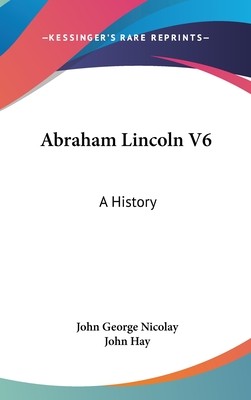
- We will send in 10–14 business days.
- Author: John George Nicolay
- Publisher: Kessinger Publishing
- ISBN-10: 0548561443
- ISBN-13: 9780548561447
- Format: 15.2 x 22.9 x 3.7 cm, kieti viršeliai
- Language: English
- SAVE -10% with code: EXTRA
Reviews
Description
Considered one of the best treatments of the presidency of Abraham Lincoln of its time, this portrait of the man and his administration of the United States at the moment of its greatest upheaval is both intimate and scholarly. Written by two private secretaries to the president and first published in 1890, this astonishingly in-depth work is still praised today for its clear, easy-to-read style and vitality.
Excerpt: Hitherto he had declared he did not care whether slavery was voted down or voted up. He had said he would not argue the question whether slavery was right or wrong. He had adopted Taney's assertion that the negro had no share in the Declaration of Independence. He had asserted that uniformity was impossible, but that freedom and slavery might abide together forever. But now that the election was over and a new term in the Senate secure, he was ready to conciliate pro-slavery opinion with stronger expressions. Hence, in a speech at Memphis, he cunningly linked together in argument unfriendly legislation, slavery, and annexation.
EXTRA 10 % discount with code: EXTRA
The promotion ends in 22d.13:41:26
The discount code is valid when purchasing from 10 €. Discounts do not stack.
- Author: John George Nicolay
- Publisher: Kessinger Publishing
- ISBN-10: 0548561443
- ISBN-13: 9780548561447
- Format: 15.2 x 22.9 x 3.7 cm, kieti viršeliai
- Language: English English
Considered one of the best treatments of the presidency of Abraham Lincoln of its time, this portrait of the man and his administration of the United States at the moment of its greatest upheaval is both intimate and scholarly. Written by two private secretaries to the president and first published in 1890, this astonishingly in-depth work is still praised today for its clear, easy-to-read style and vitality.
Excerpt: Hitherto he had declared he did not care whether slavery was voted down or voted up. He had said he would not argue the question whether slavery was right or wrong. He had adopted Taney's assertion that the negro had no share in the Declaration of Independence. He had asserted that uniformity was impossible, but that freedom and slavery might abide together forever. But now that the election was over and a new term in the Senate secure, he was ready to conciliate pro-slavery opinion with stronger expressions. Hence, in a speech at Memphis, he cunningly linked together in argument unfriendly legislation, slavery, and annexation.


Reviews